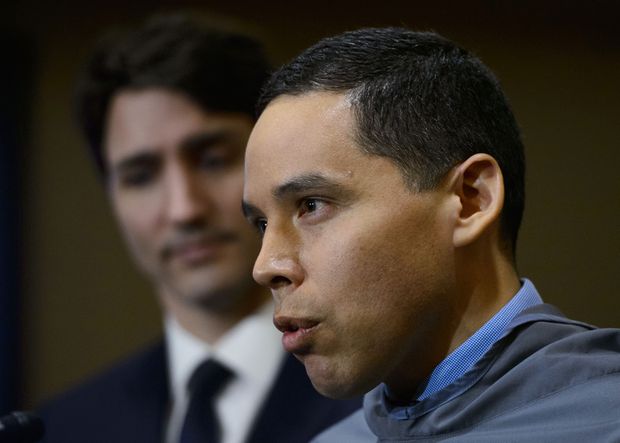Inuit, Métis groups welcome hiring of Commissioner of Indigenous Languages

Natan Obed, president of the Inuit Tapiriit Kanatami, said it is a ‘really big deal’ that an Inuk was included in the selection committee for Canada’s first Commissioner of Indigenous Languages. In this file photo, Prime Minister Justin Trudeau looks on as Mr. Obed speaks during a press conference in Iqaluit, Nunavut on March 8, 2019.
SEAN KILPATRICK/THE CANADIAN PRESS
The national organizations representing Inuit and Métis people in Canada say they welcome the federal government’s move to hire the country’s first Commissioner of Indigenous Languages.
The federal government is currently recruiting one commissioner and up to three directors for the Office of the Commissioner of Indigenous Languages. The job posting, which closes Jan. 11, says the commissioner is expected to be a “national champion” for Indigenous languages, who will promote public awareness, conduct research and write annual reports on the effectiveness of the government’s initiatives on the file.
Natan Obed, president of the Inuit Tapiriit Kanatami, said it is a “really big deal” that an Inuk was included in the selection committee. He said the government has promised that one of the three directors being hired to support the commissioner will also be Inuk.
“We are thankful for Minister [Steven] Guilbeault and his willingness to include Inuit all throughout the process,” Mr. Obed said.
“We’ve also been promised that there will be an Inuk director along with First Nations and Métis and that also is a step forward from past practices of seeing Indigenous peoples as a melting pot and not necessarily considering the huge distinctions between First Nations, Inuit and Métis.”
David Chartrand, the national spokesperson for the Métis National Council, said he has also been told that one of the directors will be Métis.
He praised the Indigenous Languages Act, which passed last year and established the office for the first time. The goal of the act and the office is to prevent further erosion of Indigenous languages in Canada, as part of the broader effort toward reconciliation.
“This languages legislation means a lot to us,” Mr. Chartrand said.
According to the 2016 census, 4.9 per cent of the Canadian population were Indigenous, with more than half being First Nations people. There are hundreds of First Nations communities with their own distinct languages and cultures living in their traditional territories in what is now known as Canada.
Inuit, who live mainly in Nunavut, northern Quebec and the Northwest Territories, are just 4 per cent of the overall Indigenous population and leaders sometimes express concern that their unique needs can be overshadowed by larger Indigenous communities in the south.
The 2016 census also reported 70 Indigenous languages were in use. According to a Statistics Canada analysis, the number of people who could speak an Indigenous language grew by 8 per cent between 1996 and 2016. But that rate of growth was far lower than the rate of growth for the Indigenous population as a whole, which means the share of Indigenous people who can speak an Indigenous language has fallen.
Statistics Canada attributed the population growth rate largely to more people identifying themselves as Indigenous to census-takers, and said most of the language growth rate was from people learning it as a second language.
The federal government drafted the Indigenous Languages Act in collaboration with First Nations, Métis and Inuit, and has continued consultations throughout the year on the act’s implementation.
Heritage Minister Steven Guilbeault, who has responsibility for protecting Indigenous languages, said the issue is one that he “cares for and feels very deeply” about.
“This is something we’re moving along, but it doesn’t get the same attention that [tackling] web giants gets,” Mr. Guilbeault said.
Know what is happening in the halls of power with the day’s top political headlines and commentary as selected by Globe editors (subscribers only). Sign up today.



Deixe uma resposta
Você precisa fazer o login para publicar um comentário.